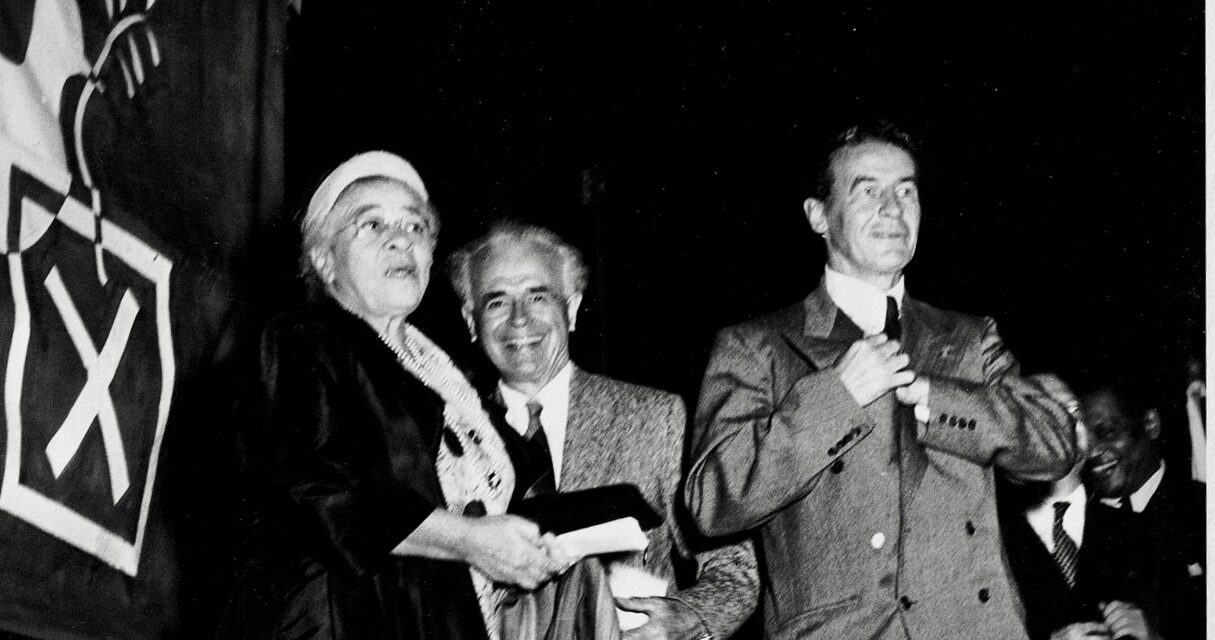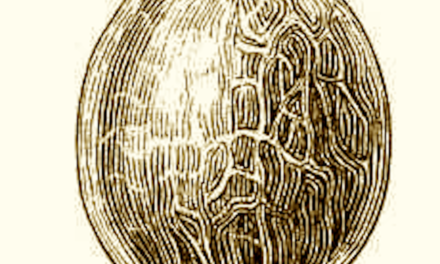By Fred Gardner Although our Hallinan saga was meant to follow rough chronological order, current events like the nomination of Kamala Harris keep triggering flashbacks. And speaking of Black women running for Vice-President, on Monday 9/7 the New York Times ran an obituary for Charlotta Bass, the newspaper editor-and-publisher who ran for VP on the Progressive Party line in 1952. At the top of the ticket was Vincent Hallinan.
In 2018 the Times began running obituaries of remarkable people who died without acknowledgment. These belated mini-biographies are often mind-blowing. A tip of the old Brooklyn Dodger cap to the Gray Lady for running them now. Better late than never.
“Charlotta Amanda Spears is believed to have been born in Sumter, S.C., around 1880,” writes Jessica Bennett in the Times. (Wikipedia says 1874.) Her father was a brick mason. She moved to Rhode Island where a brother had made it into the middle class; he owned two restaurants and an ice-truck delivery service. She was educated at Pembroke College (now part of Brown). She moved to Los Angeles in 1910 and began working at the Eagle, a Black newspaper that she was able to buy for $50 when the founding editor died.
She hired and married an experienced editor from The Topeka Plaindealer, J.B. Bass. They built the Eagle into the biggest-circulation Black newspaper on the West Coast. She ran the paper on her own after Mr. Bass died in 1934. Bennett writes:
In the pages of The Eagle, Bass denounced the Hollywood production of “The Birth of a Nation” (1915), which glorified the Ku Klux Klan, and, in the 1930s, endorsed a campaign known as “Don’t Spend Where You Can’t Work,” urging readers to boycott stores that refused to hire Black employees. She pushed for hospitals to hire Black nurses and fought against racist housing covenants.
She also reported extensively on police brutality, with front-page headlines like “Trigger-Happy Cop Freed After Slaying Youth.”
In 1925, after she wrote of a clandestine plot by the Ku Klux Klan to stage a car accident involving local Black leaders, eight Klan members showed up at her offices late at night.
A bespectacled Bass… pulled a pistol out of her desk… and the group bid a “hasty retreat.”
Bass entered politics in the 1940s, running for the Los Angeles City Council under the slogan “Don’t Fence Me In” — the title of a popular song of that era that she repurposed to condemn housing discrimination.
“Her F.B.I. file is several reams thick,” said Toni Spears Scott, a great-great-niece.
Bass’s status as “disloyal” prompted the California N.A.A.C.P. to tear up her membership card, and Iota Phi Lambda, a Black sorority, to revoke her honorary membership. Her international travel was restricted, and C.I.A. agents followed her to conferences overseas.“When I was growing up, our family really only mentioned her in whispers,” Scott said..,
Hallinan was best known for his defense of Harry Bridges, a union leader who was convicted of perjury for denying being a Communist — a verdict later overturned by the Supreme Court. In the process, Hallinan was sentenced to six months in jail for contempt of court, which is where he was when the 1952 campaign began.
And so Bass campaigned alone, speaking at a Baptist Church in New York and to autoworkers in Detroit…
Bass retired to what was then a Black resort town southeast of Los Angeles, Lake Elsinore, where she turned her garage into a community reading room and voter registration site.
She is reported to have died of a cerebral hemorrhage on April 12, 1969.
Hallinan for President
Charlotta Bass was not Vincent Hallinan’s first choice for the VP spot on the Progressive ticket in 1952. A pragmatist, Vince thought Hugh DeLacy, a former Congressman from Washington State, would help the party get more votes. Nor had Vince been his own first choice at the top of the ticket; he’d hoped that Henry Wallace would reprise his 1948 run as a Progressive. But Harry Truman had taken the US into the Korean War and Wallace would not oppose the war, which had been sanctioned by the United Nations. Vivian Hallinan, mother of six prospective draftees, was strongly anti-war and it was at her urging that Vince agreed to accept the Progressive nomination. In July, while he was doing time at McNeill Island, the party held its convention in Chicago. Vivian and Kayo’s older brother Butch (Patrick) made acceptance speeches on his behalf. They would be his surrogates on the campaign trail until he got out in —by which time Vivian would have logged 8,000 miles by train.
An early encounter with Bass in Washington, DC, left Vince impressed and moved, according to his biographer James P. Walsh. “At noon Hallinan suggested lunch but Mrs. Bass said it was a long way to the railroad station. ‘I honestly thought she meant that they had good food there. But no, she meant that it was the one place in the then segregated Capital that she knew of where a black woman might eat with a white man in public. I couldn’t believe it. It was an outrage. She thought I did know it and was pretending otherwise.”
Hallinan made his opening campaign speech in San Francisco’s Civic Auditorium. Reading Walsh’s account of it 2020 shows how far we haven’t come:
“Alongside Bass, he spoke out for the advancement of black in every sector of American life. He called for a compulsory Fair Employment Practices Act, for an end to the poll tax and other devices used to disenfranchise blacks, for new laws to combat lynching, and for federal action to end segregation in education, housing, and the military. Predicting the black revolution of the next decade, Hallinan foretold the rise of a ‘new militancy,’ supported by the bulk of 15 million black citizens left with no other recourse…
“Hallinan analyzed and explained the broader meaning of black political impotence, a facet seldom recognized by disinterested whites. Southern states, by restricting the vote of those unable to pay the poll tax, screened out the blacks at whom the tax was aimed, and with them, poor whites as well. The effective result was government by a reactionary minority.
“This vicious caste system,’ he maintained, ‘is making its victims a class of American untouchables.’ It had to end. ‘A prime condition for progress in this country for all the people, white and black, is full political, economic and social equality for the Negro people.”
Kayo vs. DiFi
Last week former Congressman Tom Campbell was back in the news as founder of a new entity called the Common Sense Party. Campbell served five terms in Congress as a so-called liberal Republican representing Silicon Valley. He resigned in 2000 to run for the Senate against Diane Feinstein, and Kayo endorsed him, although he was not enamored of Campbell’s anti-union politics. Feinstein had tried to destroy him politically. “She’s basically a red-baiter,” is how he explained her blatant animosity. In an op-ed he didn’t want me to mess with, Kayo wrote:
“It has pained me, as a loyal Democrat, that our own Senator Diane Feinstein, a native San Franciscan, has always been among the most vociferous proponents of the drug war, which has produced death, disease, racism, corruption, crime and loss of rights. As the failure of the drug war becomes more evident and the costs mount, Senator Feinstein looks it in the eye and says, ‘Give me more.’
“Over the years she has favored or sponsored ever more repressive legislation aimed at punishing drug users. She routinely votes for such Draconian measures as expelling entire families from public housing for drug possession by one member of the household and barring federal student loans on the same basis. She has also voted for the death penalty for drug offenders including large-scale marijuana growers.
“Most recently, Senator Feinstein pushed, with Orrin Hatch of Utah, an anti-methamphetamine bill which, along with increasing penalties for methamphetamine manufacture and trafficking, would have completely abridged the First Amendment, particularly on the Internet. she also just voted for the ill-conceived ‘Plan Colombia,’ which wrong-headedly assumes we can reduce drug use in this country by takin side in Colombia’s 40-year civil war.
“Four years ago, Senator Feinstein opposed Proposition 215 allowing medical use of marijuana, a measure later supported by 80 percent of our City’s voters…
“In sharp contrast to the Senator’s unreasonable and unyielding position in support of the drug war is that of her challenger, Rep. Tom Campbell of San Jose… Campbell spoke out against Plan Colombia, recognizing involvement in a civil war risks another Vietnam and at best will merely create new sources of drugs. He condemns mandatory sentencing and other prison-stuffing legislation, which siphons badly needed funds away from public education… Speaking out against the drug war is consistent with the historic role of the Bay Area as the leading edge of progressive social change in America.”
Feinstein dismissed Rep. Campbell’s position on drug-policy reform as “bizarre,” adding, “Anybody who thinks you can rehabilitate somebody addicted to narcotics by giving them narcotics, they might as well be living on another planet.”
How Corrupt is Feinstein-Blum?
In 2002 Kayo showed me a thin folder he had asked a DA in the Special Prosecutions unit to compile on Feinstein’s husband, a San Francisco investment banker named Dick Blum. , a charter member of the One Percent (as we now call our billionaires). Blum at the time was handling investments in China valued at $7 billion, and maximizing trade with China was in his —and DiFi’s— interests…
To be continued






